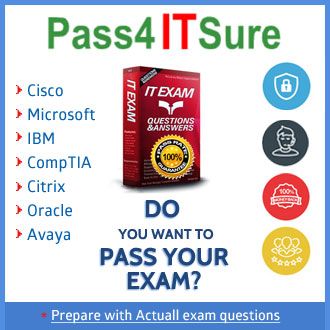Recent Posts
- Most Effective Cisco 200-901 Dumps Update
- Emergency Exam Preparation 312-50V12: A Guide To Successful Passing
- 200-301 Exam Dumps Latest | ChatGPT Tells You That Pass4itSure Is King
- PL-400 Dumps Update 2023 | New Exam Questions Answers
- HPE6-A82 Exam Dumps Updated | Worth A Try HPE6-A82 Training Materials
Categories
Microsoft Exam Dumps
microsoft azure exam dumps
- az-104 dumps (pdf + vce)
- az-120 dumps (pdf + vce)
- az-140 dumps (pdf + vce)
- az-204 dumps (pdf + vce)
- az-220 dumps (pdf + vce)
- az-303 dumps (pdf + vce)
- az-304 dumps (pdf + vce)
- az-400 dumps (pdf + vce)
- az-500 dumps (pdf + vce)
- az-600 dumps (pdf + vce)
- az-700 dumps (pdf + vce)
- more…microsoft azure exam dumps
microsoft data exam dumps
- ai-100 dumps (pdf + vce)
- ai-102 dumps (pdf + vce)
- da-100 dumps (pdf + vce)
- dp-100 dumps (pdf + vce)
- dp-200 dumps (pdf + vce)
- dp-201 dumps (pdf + vce)
- dp-203 dumps (pdf + vce)
- dp-300 dumps (pdf + vce)
- more…microsoft data exam dumps
microsoft dynamics 365 exam dumps
- mb-200 dumps (pdf + vce)
- mb-210 dumps (pdf + vce)
- mb-220 dumps (pdf + vce)
- mb-230 dumps (pdf + vce)
- mb-240 dumps (pdf + vce)
- mb-300 dumps (pdf + vce)
- mb-310 dumps (pdf + vce)
- mb-320 dumps (pdf + vce)
- mb-330 dumps (pdf + vce)
- mb-400 dumps (pdf + vce)
- mb-500 dumps (pdf + vce)
- mb-600 dumps (pdf + vce)
- mb-700 dumps (pdf + vce)
- mb-800 dumps (pdf + vce)
- pl-100 dumps (pdf + vce)
- pl-200 dumps (pdf + vce)
- pl-400 dumps (pdf + vce)
- pl-600 dumps (pdf + vce)
- more… microsoft dynamics 365 exam dumps
microsoft 365 exam dumps
- md-100 dumps (pdf + vce)
- md-101 dumps (pdf + vce)
- ms-100 dumps (pdf + vce)
- ms-101 dumps (pdf + vce)
- ms-200 dumps (pdf + vce)
- ms-201 dumps (pdf + vce)
- ms-203 dumps (pdf + vce)
- ms-300 dumps (pdf + vce)
- ms-301 dumps (pdf + vce)
- ms-500 dumps (pdf + vce)
- ms-600 dumps (pdf + vce)
- ms-700 dumps (pdf + vce)
- more… microsoft 365 exam dumps
microsoft fundamentals exam dumps
- 62-193 dumps (pdf + vce)
- az-900 dumps (pdf + vce)
- ai-900 dumps (pdf + vce)
- dp-900 dumps (pdf + vce)
- mb-901 dumps (pdf + vce)
- mb-910 dumps (pdf + vce)
- mb-920 dumps (pdf + vce)
- pl-900 dumps (pdf + vce)
- ms-900 dumps (pdf + vce)
- sc-900 dumps (pdf + vce)
microsoft certified exam dumps
- sc-200 dumps (pdf + vce)
- sc-300 dumps (pdf + vce)
- sc-400 dumps (pdf + vce)
- more…microsoft other exam dumps
microsoft mta exam dumps
- 98-349 dumps (pdf + vce)
- 98-361 dumps (pdf + vce)
- 98-362 dumps (pdf + vce)
- 98-363 dumps (pdf + vce)
- 98-364 dumps (pdf + vce)
- 98-365 dumps (pdf + vce)
- 98-366 dumps (pdf + vce)
- 98-367 dumps (pdf + vce)
- 98-368 dumps (pdf + vce)
- 98-372 dumps (pdf + vce)
- 98-375 dumps (pdf + vce)
- 98-381 dumps (pdf + vce)
- 98-383 dumps (pdf + vce)
- 98-388 dumps (pdf + vce)
Cisco Exam Dumps
Latest Cisco CCNA dumps
Latest Cisco DevNet dumps
- 200-901 dumps (pdf + vce)
- 350-901 dumps (pdf + vce)
- 300-910 dumps (pdf + vce)
- 300-915 dumps (pdf + vce)
- 300-920 dumps (pdf + vce)
Latest Cisco CCNP dumps
- 300-410 dumps (pdf + vce)
- 300-415 dumps (pdf + vce)
- 300-420 dumps (pdf + vce)
- 300-425 dumps (pdf + vce)
- 300-430 dumps (pdf + vce)
- 300-435 dumps (pdf + vce)
- 300-510 dumps (pdf + vce)
- 300-515 dumps (pdf + vce)
- 300-535 dumps (pdf + vce)
- 300-610 dumps (pdf + vce)
- 300-615 dumps (pdf + vce)
- 300-620 dumps (pdf + vce)
- 300-625 dumps (pdf + vce)
- 300-635 dumps (pdf + vce)
- 300-710 dumps (pdf + vce)
- 300-715 dumps (pdf + vce)
- 300-720 dumps (pdf + vce)
- 300-725 dumps (pdf + vce)
- 300-730 dumps (pdf + vce)
- 300-735 dumps (pdf + vce)
- 300-810 dumps (pdf + vce)
More Cisco CCNP Practice test…
Latest Cisco CCIE dumps
- 350-401 dumps (pdf + vce)
- 350-501 dumps (pdf + vce)
- 350-601 dumps (pdf + vce)
- 350-701 dumps (pdf + vce)
- 350-801 dumps (pdf + vce)
- 350-901 dumps (pdf + vce)
Latest Cisco CCDE dumps
Latest Cisco Special dumps
- 010-151 dumps (pdf + vce)
- 100-490 dumps (pdf + vce)
- 200-201 dumps (pdf + vce)
- 500-173 dumps (pdf + vce)
- 500-052 dumps (pdf + vce)
- 500-301 dumps (pdf + vce)
- 500-230 dumps (pdf + vce)
- 500-325 dumps (pdf + vce)
- 500-490 dumps (pdf + vce)
- 500-601 dumps (pdf + vce)
- 500-651 dumps (pdf + vce)
- 500-710 dumps (pdf + vce)
- 500-470 dumps (pdf + vce)
- 500-551 dumps (pdf + vce)
- 500-701 dumps (pdf + vce)
- 500-440 dumps (pdf + vce)
- 500-450 dumps (pdf + vce)
- 500-210 dumps (pdf + vce)
- 500-220 dumps (pdf + vce)
- 500-285 dumps (pdf + vce)
- 600-660 dumps (pdf + vce)
- 700-020 dumps (pdf + vce)
- 700-038 dumps (pdf + vce)
- 700-039 dumps (pdf + vce)
- 700-105 dumps (pdf + vce)
- 700-172 dumps (pdf + vce)
- 700-260 dumps (pdf + vce)
- 700-265 dumps (pdf + vce)
- 700-501 dumps (pdf + vce)
- 700-505 dumps (pdf + vce)
- 700-551 dumps (pdf + vce)
- 700-651 dumps (pdf + vce)
- 700-680 dumps (pdf + vce)
- 700-760 dumps (pdf + vce)
- 700-751 dumps (pdf + vce)
- 700-765 dumps (pdf + vce)
- 700-802 dumps (pdf + vce)
- 700-901 dumps (pdf + vce)
- 700-905 dumps (pdf + vce)
- 810-440 dumps (pdf + vce)
- 820-605 dumps (pdf + vce)
Tags
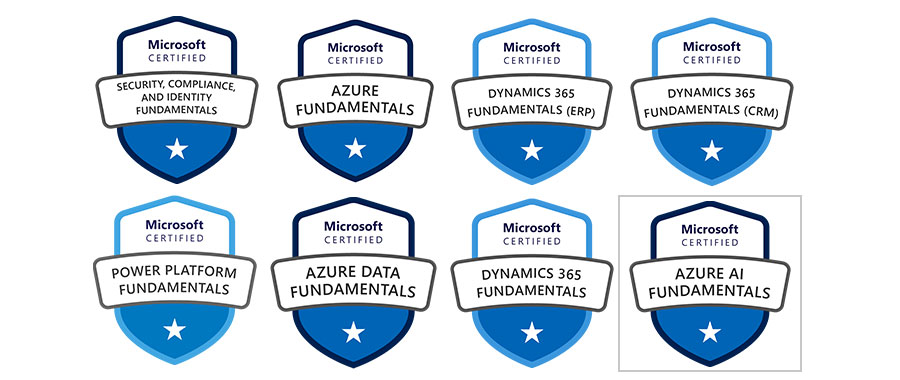
What you should know:
Microsoft Azure AI Fundamentals – Candidates for this exam should have a foundational knowledge of machine learning (ML) and artificial intelligence (AI) concepts and related Microsoft Azure services.
Azure AI Fundamentals can be used to prepare for other Azure role-based certifications like Azure Data Scientist Associate or Azure AI Engineer Associate, but it’s not a prerequisite for any of them.
You may be eligible for ACE college credit if you pass this certification exam.
Required skills:
Describe AI workloads and considerations
Describe fundamental principles of machine learning on Azure
Describe features of computer vision workloads on Azure
Describe features of Natural Language Processing (NLP) workloads on Azure
Describe features of conversational AI workloads on Azure
Passing the Microsoft Azure AI Fundamentals – AI-900 exam is not a simple matter. Participate in the free Microsoft AI-900 exam questions and practice on this site to improve your skills. 100% pass the exam
Here: https://www.leads4pass.com/ai-900.html (PDF+VCE). lead4pass ai-900 has two modes: PDF and VCE. You can choose any. Lead4Pass has a super high pass rate and is The safest exam guarantee! Next, continue to share the AI-900 exam
Microsoft AI-900 exam PDF free download
Google Drive: https://drive.google.com/file/d/16UGzDArx1Hz8GAJRhKOavvuJPLeLpG53/view?usp=sharing
Not everyone is omnipotent, but I still introduced more information about Microsoft Fundamentals.
If you want to know more, you can search for related knowledge with the following keywords. Lead4Pass includes all of the following exam content.
Fundamentals expand:
- Microsoft Azure AI Fundamentals
- Microsoft Azure Fundamentals
- Microsoft Azure Data Fundamentals
- Microsoft Dynamics 365 Fundamentals Customer Engagement Apps (CRM)
- Microsoft Dynamics 365 Fundamentals Finance and Operations Apps (ERP)
- Microsoft 365 Fundamentals
- Microsoft Power Platform Fundamentals
- Microsoft Security Compliance and Identity Fundamentals
Microsoft AI-900 exam practice questions
QUESTION 1
HOTSPOT
To complete the sentence, select the appropriate option in the answer area.
Hot Area:

Correct Answer:

Azure Custom Vision is a cognitive service that lets you build, deploy, and improve your own image classifiers. An
image classifier is an AI service that applies labels (which represent classes) to images, according to their visual
characteristics. Unlike the Computer Vision service, Custom Vision allows you to specify the labels to apply.
Note: The Custom Vision service uses a machine learning algorithm to apply labels to images. You, the developer, must
submit groups of images that feature and lack the characteristics in question. You label the images yourself at the time
of submission. Then the algorithm trains to this data and calculates its own accuracy by testing itself on those same
images. Once the algorithm is trained, you can test, retrain, and eventually use it to classify new images according to
the needs of your app. You can also export the model itself for offline use.
Incorrect Answers:
Computer Vision:
Azure\\’s Computer Vision service provides developers with access to advanced algorithms that process images and
return information based on the visual features you\\’re interested in. For example, Computer Vision can determine
whether an image contains adult content, find specific brands or objects, or find human faces.
Reference:
https://docs.microsoft.com/en-us/azure/cognitive-services/custom-vision-service/home
QUESTION 2
You need to build an app that will read recipe instructions aloud to support users who have reduced vision. Which
version service should you use?
A. Text Analytics
B. Translator Text
C. Speech
D. Language Understanding (LUIS)
Correct Answer: C
Reference: https://azure.microsoft.com/en-us/services/cognitive-services/text-to-speech/#features
QUESTION 3
HOTSPOT
For each of the following statements, select Yes if the statement is true. Otherwise, select No.
NOTE: Each correct selection is worth one point.
Hot Area:

Correct Answer:
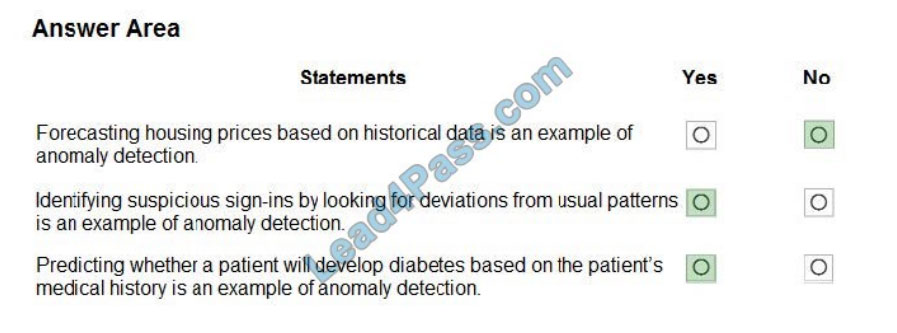
Anomaly detection encompasses many important tasks in machine learning:
Identifying transactions that are potentially fraudulent.
Learning patterns that indicate that a network intrusion has occurred.
Finding abnormal clusters of patients.
Checking values entered into a system.
Reference:
https://docs.microsoft.com/en-us/azure/machine-learning/studio-module-reference/anomaly-detection
QUESTION 4
HOTSPOT
You have a database that contains a list of employees and their photos.
You are tagging new photos of the employees.
For each of the following statements select Yes if the statement is true. Otherwise, select No.
NOTE: Each correct selection is worth one point.
Hot Area:

Correct Answer:
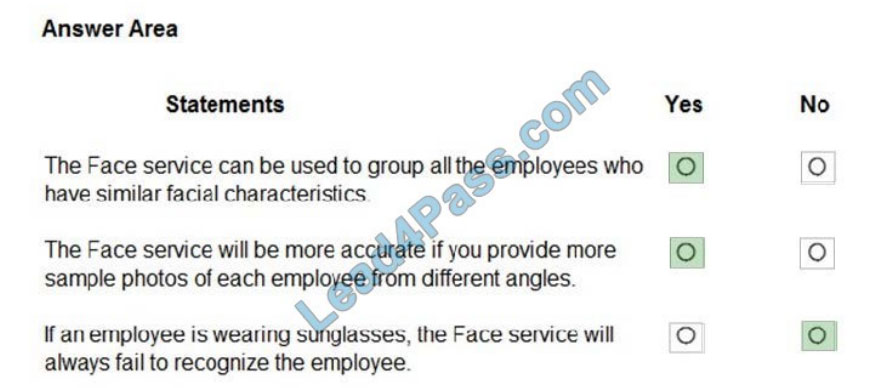
Reference: https://docs.microsoft.com/en-us/azure/cognitive-services/face/overview https://docs.microsoft.com/enus/azure/cognitive-services/face/concepts/face-detection
QUESTION 5
A medical research project uses a large anonymized dataset of brain scan images that are categorized into predefined
brain haemorrhage types.
You need to use machine learning to support early detection of the different brain haemorrhage types in the images
before the images are reviewed by a person.
This is an example of which type of machine learning?
A. clustering
B. regression
C. classification
Correct Answer: C
QUESTION 6
HOTSPOT
To complete the sentence, select the appropriate option in the answer area.
Hot Area:

Correct Answer:

In machine learning, if you have labeled data, that means your data is marked up, or annotated, to show the target,
which is the answer you want your machine learning model to predict.
In general, data labeling can refer to tasks that include data tagging, annotation, classification, moderation, transcription, or processing.
Incorrect Answers:
Not features: In machine learning and statistics, feature selection is the process of selecting a subset of relevant, useful
features to use in building an analytical model. Feature selection helps narrow the field of data to the most valuable
inputs. Narrowing the field of data helps reduce noise and improve training performance.
Reference:
https://www.cloudfactory.com/data-labeling-guide
QUESTION 7
HOTSPOT
To complete the sentence, select the appropriate option in the answer area.
Hot Area:

Correct Answer:

Reference: https://docs.microsoft.com/en-us/azure/machine-learning/team-data-science-process/create-features
QUESTION 8
HOTSPOT
To complete the sentence, select the appropriate option in the answer area.
Hot Area:
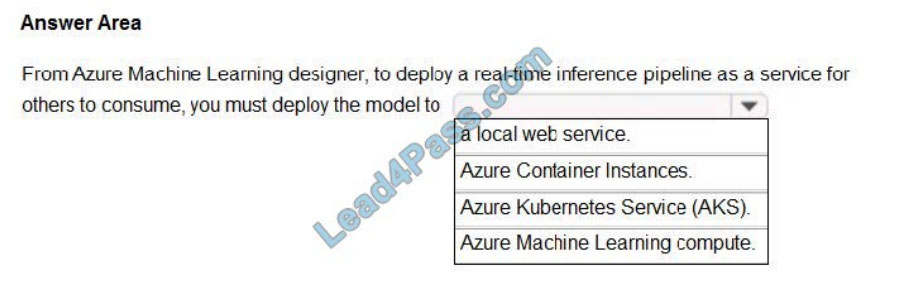
Correct Answer:

To perform real-time inferencing, you must deploy a pipeline as a real-time endpoint. Real-time endpoints must be
deployed to an Azure Kubernetes Service cluster.
Reference: https://docs.microsoft.com/en-us/azure/machine-learning/concept-designer#deploy
QUESTION 9
You have a frequently asked questions (FAQ) PDF file.
You need to create a conversational support system based on the FAQ.
Which service should you use?
A. QnA Maker
B. Text Analytics
C. Computer Vision
D. Language Understanding (LUIS)
Correct Answer: A
QnA Maker is a cloud-based API service that lets you create a conversational question-and-answer layer over your
existing data. Use it to build a knowledge base by extracting questions and answers from your semi-structured content,
including FAQs, manuals, and documents.
Reference: https://azure.microsoft.com/en-us/services/cognitive-services/qna-maker/
QUESTION 10
HOTSPOT
To complete the sentence, select the appropriate option in the answer area.
Hot Area:

Correct Answer:

In the most basic sense, regression refers to prediction of a numeric target.
Linear regression attempts to establish a linear relationship between one or more independent variables and a numeric
outcome, or dependent variable.
You use this module to define a linear regression method, and then train a model using a labeled dataset. The trained
model can then be used to make predictions.
Incorrect Answers:
1. Classification is a machine learning method that uses data to determine the category, type, or class of an item or row of data.
2.Clustering, in machine learning, is a method of grouping data points into similar clusters. It is also called segmentation.
Over the years, many clustering algorithms have been developed. Almost all clustering algorithms use the features of
individual items to find similar items. For example, you might apply clustering to find similar people by demographics.
You might use clustering with text analysis to group sentences with similar topics or sentiment.
Reference: https://docs.microsoft.com/en-us/azure/machine-learning/algorithm-module-reference/linear-regression https://docs.microsoft.com/en-us/azure/machine-learning/studio-module-reference/machine-learning-initialize-modelclustering
QUESTION 11
HOTSPOT
To complete the sentence, select the appropriate option in the answer area.
Hot Area:

Correct Answer:

Accelerate your business processes by automating information extraction. Form Recognizer applies advanced machine
learning to accurately extract text, key/value pairs, and tables from documents. With just a few samples, Form
Recognizer tailors its understanding to your documents, both on-premises and in the cloud. Turn forms into usable data at a fraction of the time and cost, so you can focus more time acting on the information rather than compiling it.
Reference: https://azure.microsoft.com/en-us/services/cognitive-services/form-recognizer/
QUESTION 12
HOTSPOT
For each of the following statements, select Yes if the statement is true. Otherwise, select No.
NOTE: Each correct selection is worth one point.
Hot Area:

Correct Answer:
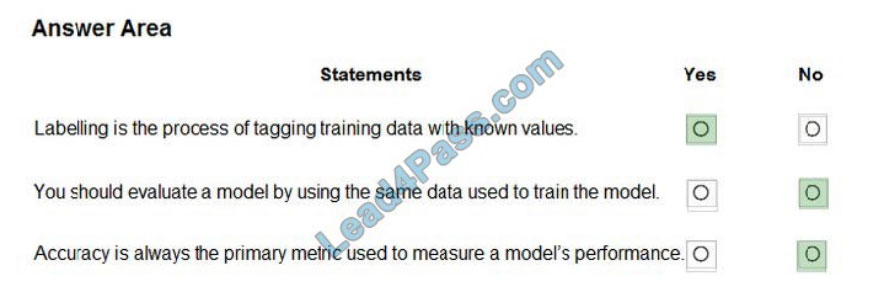
Box 1: Yes
In machine learning, if you have labeled data, that means your data is marked up, or annotated, to show the target,
which is the answer you want your machine learning model to predict.
In general, data labeling can refer to tasks that include data tagging, annotation, classification, moderation, transcription,
or processing.
Box 2: No
Box 3: No
Accuracy is simply the proportion of correctly classified instances. It is usually the first metric you look at when
evaluating a classifier. However, when the test data is unbalanced (where most of the instances belong to one of the
classes), or you are more interested in the performance on either one of the classes, accuracy doesn\\’t really capture the effectiveness of a classifier.
Reference:
https://www.cloudfactory.com/data-labeling-guide
https://docs.microsoft.com/en-us/azure/machine-learning/studio/evaluate-model-performance
QUESTION 13
You have the Predicted vs. True chart shown in the following exhibit.
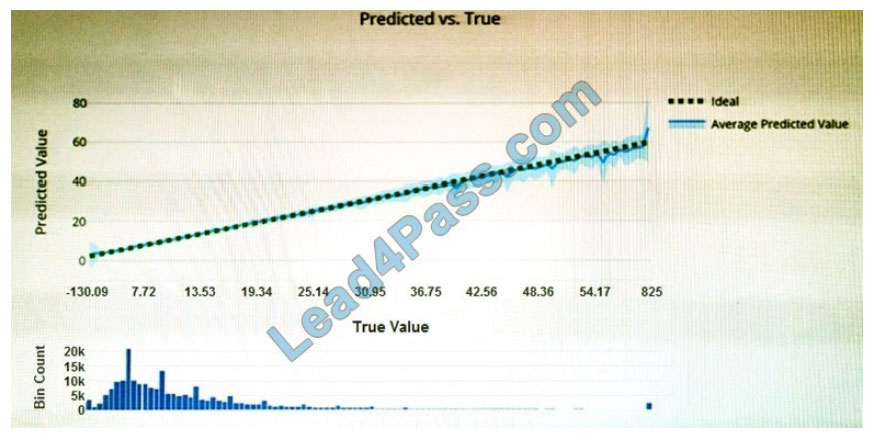
Which type of model is the chart used to evaluate?
A. classification
B. regression
C. clustering
Correct Answer: B
What is a Predicted vs. True chart?
Predicted vs. True shows the relationship between a predicted value and its correlating true value for a regression
problem. This graph can be used to measure performance of a model as the closer to the y=x line the predicted values
are, the better the accuracy of a predictive model.
Reference:
https://docs.microsoft.com/en-us/azure/machine-learning/how-to-understand-automated-m
[Advanced]Lead4pass ai-900 Exam Dumps:https://www.leads4pass.com/ai-900.html (Total Questions: 129 Q&A)
Microsoft AI-900 exam PDF free download
Google Drive: https://drive.google.com/file/d/16UGzDArx1Hz8GAJRhKOavvuJPLeLpG53/view?usp=sharing
I know you still have a lot of questions
Why should I get the Microsoft Azure AI Fundamentals exam certification?
How should I prepare for the exam?
How do I register for a Microsoft certification exam?
How much does the exam cost?
How does Microsoft decide how many questions on a particular topic to include in the exam?
Why use the case study exam format?
Can I request a re-evaluation of my score?
If I fail the exam, can I get a refund?
…
Microsoft exam policy and frequently asked questions: The above questions have been answered, you don’t need to find any blog to answer you. It also includes exam discounts, exam confidentiality, exam scoring, and more. To help you save more time, Microsoft has helped you answer one by one: https://docs.microsoft.com/en-us/learn/certifications/frequently-asked-questions
